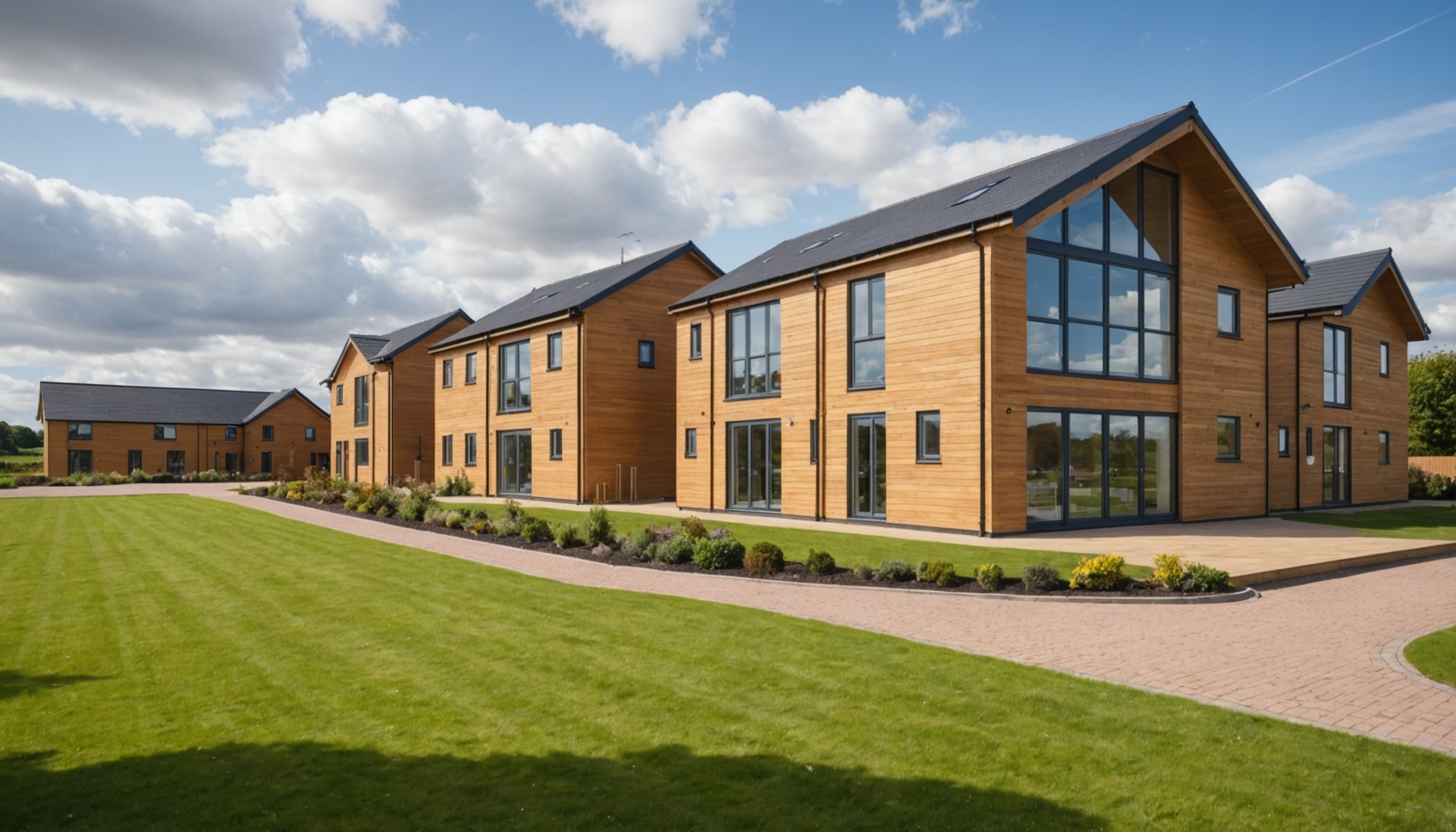Overview of Modular Construction
Modular construction revolutionises the building industry by assembling structures off-site in controlled settings, then transporting and installing them at their final locations. This approach utilises prefabricated modules that fit together seamlessly. Often employed for rural housing, modular construction offers a streamlined solution with significant time savings.
Historically, the concept took root in the UK during the post-war period. Faced with the need for rapid housing solutions, the UK government turned to modular construction as a viable option. This method has evolved significantly since the 1940s, now incorporating innovative techniques and materials that enhance its efficiency and sustainability.
This might interest you : Unlocking Real Estate Insights: Harnessing Geospatial Data for Smart Market Analysis and Investment Tactics
Comparatively, traditional construction methods involve on-site building from the ground up, which can be time-consuming and weather-dependent. Modular construction, however, minimises disruptions and delays by completing up to 90% of the building process off-site. This methodology not only reduces construction time but also cuts waste and minimises environmental impact due to enhanced quality control.
In a time where adaptability and speed are paramount, modular construction stands as a compelling alternative to conventional approaches, especially in rural housing. Its development reflects a continual evolution towards more sustainable and efficient building practices.
In parallel : How Digital Connectivity Influences Property Values in Remote Areas of the UK
Benefits of Modular Construction for Rural Housing
In rural housing, modular construction is gaining popularity due to its numerous advantages, particularly its cost-effectiveness and rapid construction speeds. By utilizing factory-based assembly, modular homes significantly reduce costs through standardized processes and economies of scale. This method allows for bulk purchasing of materials and streamlines the building process, leading to substantial savings.
Furthermore, modular construction drastically cuts down on construction time. On average, modular homes can be completed and occupied in a fraction of the time it takes to build traditional homes. This efficiency results in quicker occupancy, which is particularly beneficial in rural areas where housing demand can be urgent.
Another advantage is enhanced sustainability. Modular construction minimizes waste by using precise measurements and efficient material usage, contributing to more eco-friendly building practices. Since the components are pre-fabricated, less on-site waste is generated, aligning with growing demands for sustainable housing.
Overall, modular construction demonstrates a practical and innovative solution for rural housing needs, offering cost savings, faster completion, and sustainability. These benefits make it an appealing option for developers, homeowners, and environmentalists alike.
Case Studies of Modular Housing in the UK
Exploring modular housing examples in the UK reveals insightful success stories that highlight effective implementation strategies and their impact on the local communities.
Examples of Successful Projects
Some of the leading modular housing projects have gained significant traction in rural areas. These projects showcase innovative construction techniques that reduce build times while maintaining high-quality standards. One example, Wolverhampton Interchange 10, demonstrates how using modular construction can expedite project completion and offer affordable housing solutions for residents. Contractors involved in such projects frequently report efficiencies in terms of time and cost savings, allowing for quicker project timelines without compromising on quality.
Additionally, community feedback often reflects resident satisfaction due to the swift availability of new homes tailored to their needs. These projects, therefore, illustrate not only construction efficacy but also positive social impacts.
Impacts on Local Communities
The implementation of modular housing fosters significant contributions to the local economy and job creation. By utilizing local supply chains and labour forces, these projects support economic growth. Furthermore, they expand housing options for families and individuals, directly addressing housing shortages. This method integrates seamlessly with existing community assets, ensuring new developments bring additional services rather than strain resources. Such thoughtful integration helps enhance overall community cohesion and satisfaction.
Policy Recommendations for Supporting Modular Construction
As the demand for sustainable building solutions continues to grow, there is a clear need for a policy framework that can effectively support modular construction. To begin, suggested policy measures should incentivize the adoption of these innovative building methods through a combination of tax benefits, grants, and streamlined approval processes. By reducing financial barriers, modular solutions can become a more accessible option for both builders and developers.
Building regulations must be thoughtfully aligned with modular techniques to facilitate smoother integration into existing construction standards. This means updating codes to recognise and approve pre-fabricated components without unnecessary delays, hence minimising bureaucratic hurdles. Moreover, ensuring that these standards are uniform can help broaden acceptance and application across different regions.
Local and national governments have a significant role to play in promoting these initiatives. This includes proactive involvement in educating stakeholders about the benefits of modular approaches and engaging in partnerships with industry leaders to promote research and development. By establishing a collaborative environment, governments can nurture an innovation-friendly ecosystem that accelerates the transition towards modular construction methodologies.
Ultimately, a supportive policy framework will be instrumental in unlocking the full potential of modular construction to address current and future housing challenges.
Addressing Challenges in Modular Construction
In the evolving landscape of modular construction, particularly in rural housing, several challenges have surfaced that need addressing. These include the sourcing of materials, securing skilled labor, and boosting public perception and acceptance.
One major challenge is sourcing the right materials. Rural areas often experience logistical hurdles, which can hinder timely delivery. Collaborative efforts with local suppliers and establishing regional hubs can overcome obstacles related to material availability.
Securing skilled labor is another significant obstacle. The industry often grapples with a shortage of trained workers, which can delay projects and affect quality. Implementing training programs and partnering with vocational institutions can address this by developing a local skilled workforce.
Public perception poses a further challenge. Modular construction is often misconceived as inferior to traditional building methods. Enhancing acceptance involves educating the public on the benefits, including sustainability, speed, and cost-effectiveness. Overcoming obstacles here can be achieved through community workshops, demonstrating project success stories.
By embracing these strategies, the modular construction industry can effectively overcome obstacles and secure its place as a viable option for rural housing development. This proactive approach promises to transform industry concerns into opportunities for growth and innovation.
Conclusion: The Future of Rural Housing in the UK
In the realm of rural housing, future trends are leaning heavily towards innovation, particularly in the area of modular construction technology. This shift presents a substantial opportunity for solving the housing crisis in remote regions. Modular housing is celebrated for its efficiency, with homes being rapidly constructed in controlled environments before being transported to their final site. This method significantly reduces the construction time and environmental impact.
Rural housing solutions are set to benefit greatly as predictions indicate that modular housing will play a critical role in rural development. The versatility of modular housing means it can be tailored to suit diverse landscapes and community needs, making it an attractive option for rural areas. Its implementation is expected to accelerate development and provide affordable alternatives where traditional construction methods are less feasible.
Collaboration between stakeholders—ranging from government bodies to private companies—is essential for future success in rural housing initiatives. By working together, these groups can ensure that modular innovation is effectively integrated into the housing market, addressing both current needs and future growth. As technologies evolve, the potential to transform rural housing landscapes grows, promising holistic solutions for these communities.











